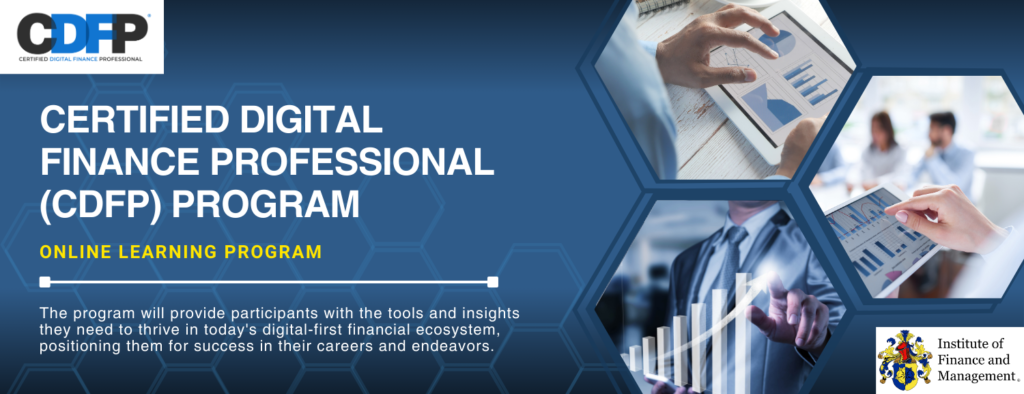
OVERVIEW
The Certified Digital Finance Professional (CDFP) Program offers comprehensive insights into the evolving landscape of finance in the digital era.
Covering essential topics such as the role of the finance function, technological advancements, data management, and collaborative relationships within organizations, this program equips participants with the knowledge and skills to navigate the complexities of modern finance.

Learning Objectives
Upon completing the Professional Certificate in Digital Finance, participants will:
- Understand the evolving role of the finance function within the external context of an organization.
- Demonstrate the significance of ethical behavior and corporate governance for finance professionals.
- Identify and analyze the impact of technology, including big data analytics, blockchain, AI, and IoT, on organizational finance.
- Develop strategies for effective data management and utilization to enhance organizational value.
- Explore collaborative relationships between the finance function and operational departments, sales and marketing, human resources, and IT, to drive organizational success.
Body of knowledge
The CDFP program equips professionals with the skills and knowledge necessary to navigate the rapidly evolving digital finance landscape. The comprehensive curriculum spans across key areas critical to digital finance success:
Digital Financial Ecosystem
- An overview of the digital finance environment, including digital currencies, fintech innovations, blockchain technology, and the regulatory frameworks shaping the industry.
Financial Technologies (FinTech)
- A deep dive into cutting-edge financial technologies, covering areas such as artificial intelligence (AI) in finance, machine learning applications, and the use of big data for financial decision-making.
Blockchain and Cryptocurrencies
- Exploration of blockchain technology fundamentals, decentralized finance (DeFi), and the use of cryptocurrencies in financial markets, focusing on both opportunities and risks.
Digital Payments and Transactions
- Insight into the latest advancements in digital payment systems, including mobile payments, peer-to-peer transfers, and emerging innovations like CBDCs (Central Bank Digital Currencies).
Risk Management in Digital Finance
- Strategies to identify, assess, and manage risks in digital finance environments, with a focus on cybersecurity threats, data protection, and regulatory compliance.
Regulatory Compliance in Digital Finance
- An understanding of the evolving regulatory landscape for digital finance, including anti-money laundering (AML), know your customer (KYC) protocols, and international financial regulations.
Financial Analytics and Decision-Making
- Tools and techniques for analyzing financial data in a digital context, including predictive analytics, real-time data processing, and digital financial modeling.
Customer Experience in Digital Finance
- Examines how to design and implement digital solutions that enhance the customer experience, focusing on personalization, convenience, and secure access to financial services.
